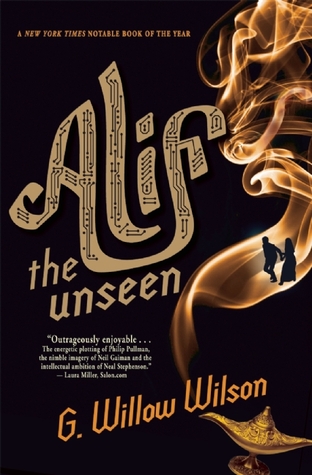You know the Moonlit Library is back when our reviews are three days late! It's good to renew old traditions. Anyway, on to the review.
I'm here to tell you, not about a book, but about a story. Alif the Unseen typifies what a good story should be - it's the kind of story that you can imagine being told around a fire. Granted, that's a vague piece of criteria for a "good story," but I'd like to convince you with more evidence.
Amazon's summary goes something like this: "In an unnamed Middle Eastern security state, a young Arab-Indian hacker shields his clients - dissidents, outlaws, Islamists, and other watched groups - from surveillance and tries to stay out of trouble. He goes by Alif - the first letter of the Arabic alphabet, and a convenient handle to hide behind. The aristocratic woman Alif loves has jilted him for a prince chosen by her parents, and his computer has just been breached by the state's electronic security force, putting his clients and his own neck on the line. Then it turns out his lover's new fiancé is the 'Hand of God,' as they call the head of state security, and his henchman come after Alif, driving him underground. When Alif discovers The Thousand and One Days, the secret book of the jinn, which both he and the Hand suspect may unleash a new level of information technology, the stakes are raised and Alif must struggle for life or death, aided by forces seen and unseen."
Sounds pretty simple, right? WRONG. Alif is filled with twists and turns, characters good and bad and in between. It's filled with beautiful musings on technology and religion and myth and story and the interplay of them all. It contains awe-inspiring descriptions of the Middle Eastern setting and of the supernatural elements that drag you right into the story. It's also very often pretty hilarious. But don't get me wrong - Wilson is never didactic with any of these topics. The characters are the perfect vehicles for the themes and topics that come up in this story.
Alif is a fantastic non-hero. He's a pretty typical basement-dwelling computer geek, except that he's really, really good at what he does. He's something of a technological prodigy, and yet he's also a really normal dude. His problems start because he goes gung-ho with a blocking program after he's dumped by his girlfriend. He's fifty shades of pathetic, and that makes him flawed, understandable, and endearing, all at the same time. Both his strengths and his flaws are a huge influence on how he reacts to the story going on around him. Wilson handles the humanity of her main character flawlessly.
The supporting characters are so good, too! Wow! Alif's childhood friend, Dina, shines as a sort of "primary side char," who never acts or speaks as if her only purpose in the novel is to be Alif's moral center (though she does sometimes fill that role). She's a well-rounded character with her own life and motivations, strengths and weaknesses. Likewise, Vikram, the first jinn that Alif meets, is a wonderful example of how to write an inhuman character. He's snarky, insensitive to humans' needs, and not always exactly moral as Alif would prefer. But he's real, as real as any of the other characters. The other, lesser side chars - the American convert, Alif's hacker friend, the Sheikh, the other jinn - not to mention the villainous characters, are just as well-drawn, just as real. In short, the characters never felt like characters who existed only as soon as they came on the page; they felt like they had always existed, and the story was just a part of their very real lives.
Like I mentioned, there's a lot of musings on religion and faith, and on art and technology. They're organically drawn into the plot of the story, which is, after all, based on computer technology and Arabic literature (mainly The Thousand and One Nights and the Quran). Not only are they not shoehorned in like sermons or platitudes, they're required by the story. It's a story that needs an intelligent, sensitive handling of faith and art, and Wilson delivers. Does she deliver.
All that rambling about pros (and nothing about cons) to say, read this book. Wilson writes beautifully about beautiful topics and beautiful characters. It's a must-read for anyone who likes good books. Period.
Subscribe to:
Post Comments (Atom)


No comments:
Post a Comment